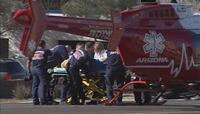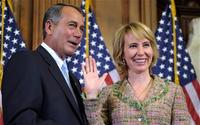-
Rep. Clyburn calls for increased spending on lawmakers' safety
After the shooting of Representative Gabrielle Giffords, Representative James Clyburn called for increases in spending to protect lawmakers; the House voted last week to reduce its operating budget by 5 percent; Congressional security officials are currently reviewing security measures and briefing members and their staffers on security
-
-
Officials warn of Arizona copycat attacks

Intelligence and law enforcement authorities informed U.S. lawmakers that they are monitoring for potential “copycat” attacks on lawmakers after the rampage in Arizona on Saturday; Rep. Peter King, chairman of the House Homeland Security Committee, said he expects to ask for a formal report on the shooting, addressing both the short-term concerns — including the likelihood of copycat incidents — and long-term issues with security; among the questions he wants answered, King said, are “Is this part of a larger movement? Is there any evidence he [the assailant] was motivated by organizational structure?” FBI director Robert Mueller said: “Given this tragedy, all logical precautions are in place to best ensure the safety of other public officials, but there is no information at this time to suggest any specific threat remains”
-
-
Iran: Mossad targeting scientists
Iran says it has arrested members of a an Israeli spy network responsible for targeting Iranian nuclear scientists; Israel has a history of killing nuclear scientists of neighboring states embarking on nuclear weapons programs — this was the case with Egyptian scientists and their European helpers in the early 1960s, and with Iraqi scientists in the 1980s; the assassination of a dozen or so leading Iranian nuclear scientists has also been linked to the Mossad
-
-
Shaken lawmakers weigh additional security measures

Following the shooting of Representative Gabrielle Giffords (D-Arizona), more than 800 participants — members of Congress, their spouses, and staffs — take part in a conference call Sunday; the FBI, House Sergeant at Arms Bill Livingood, and U.S. Capitol Police Chief Phil Morse detailed security measures lawmakers and their family members should take both in Washington, D.C. and in their home districts; another security briefing for lawmakers is scheduled for Wednesday; the last time a member of Congress was shot and killed was in 1978, when Representative Leo Ryan (D-California) tried to leave Jonestown, Guyana, with members of Jim Jones’s cult; six members of Congress have been murdered as well as two senators — Huey Long in 1935 and Robert Kennedy in 1968; five members of Congress were injured when Puerto Rican nationalists shot up the House chamber on 21 March 1954
-
-
Suspected Arizona gunman passed FBI background check
The alleged shooter of Representative Giffords and eighteen other people in Arizona purchased a firearm legally — and after passing an FBI background check — from Sportsman’s Warehouse’s Tucson store in November; Loughner did not present a concealed weapons permit so he was required to pass an FBI background check, which he did “immediately and without incident,” the company which owns the store says; a DHS memo ties Loughner to the extremist group American Renaissance, which DHS describes as “anti-government, anti-immigration, anti-ZOG (Zionist Occupational Government), anti-Semitic”; the group leader says Loughner had no connection with his group
-
-
Pentagon's budget cuts could signal future Homeland Security cuts
National security budgets are no longer safe from cuts; lawmakers are increasingly targeting military, veterans, and Homeland Security budgets for cuts despite agreements and precedent to the contrary; on Thursday the Pentagon announced over $150 billion in savings that include $78 billion in budget cuts and a potential increase in fees for veterans’ healthcare; DHS cuts could be on their way next
-
-
K-State doctoral dissertation examines food bioterrorism
Terrorist “chatter” and information gleaned from informants have led DHS to warn restaurants and hotels that terrorists are planning to use biological agents to contaminate food in readily accessible areas such as salad bars, cafeteria food displays, and more; a Kansas State graduate student writes a dissertation on how restaurants in country clubs protect themselves against this risk; he finds that they do not do much
-
-
Groundbreaking for $1.2 billion NSA Utah center
Today is groundbreaking day for the Utah Data Center, a $1.2 billion project which will employ more than 10,000 people for its construction, and is thus seen as the salvation for the state’s beleaguered construction industry; the National Security Agency (NSA) will use the climate-controlled environment of its computerized core as a repository for information gathered by different branches of the country’s intelligence apparatus, hence the facility’s nickname, “The Spy Center.”
-
-
U.K. consulate staff arrested in plot to bomb Jerusalem soccer stadium

Two Palestinian employees of the U.K. consulate general in East Jerusalem have been arrested over an alleged weapons plot; the U.K. Foreign Office spokeswoman said the two consulate employees were suspected of trying to obtain weapons for a rocket attack on Teddy Stadium, the home of the Beitar Jerusalem soccer team; the activities of the two consulate employees included systematically checking how best to launch rockets into the stadium while the stadium was crowded with people during a game; the launching of the rockets was to be carried out by two Hamas members, who were also arrested; questions raised in the U.K.. about vetting procedures at the consulate
-
-
Homegrown terrorists share characteristics, backgrounds
Since the 9/11 attacks, 90 people were arrested in the United States on terrorism charges for plots or attacks against the United States; a new study of the group finds that 44 percent had prior criminal records; 61 percent of the terrorism defendants attended some college, including three who earned doctoral degrees; 64 percent of those college-educated terrorism suspects were engineering majors
-
-
Al Qaeda aiming at soft targets in U.S.
DHS has ramped up its efforts to protect soft targets in the United States from terrorist attack this year; the department has issued bulletins to state and local law enforcement warning of the possibility terrorists could target religious gatherings, sports matches, and parades; the al Qaeda affiliate in Yemen puts out an online magazine in English that encourages U.S. residents to plan attacks. Suggestions include driving a truck into a crowded place or shooting into a restaurant
-
-
U.S. terror watch list streamlined, updated instantaneously

Now a single tip about a terror link will be enough for inclusion in the watch list for U.S. security officials, who have also evolved a quicker system to share the database of potential terrorists among screening agencies; a senior U.S. counter-terrorism official said that officials have now “effectively in a broad stroke lowered the bar for inclusion” in the list; the new criteria have led to only modest growth in the list, which stands at 440,000 people, about 5 percent more than last year; also, instead of sending data once a night to the Terrorist Screening Center’s watch list, which can take hours, the new system should be able to update the watch list almost instantly as names are entered
-
-
Terrorists' lone-wolf approach changes U.S. strategy
The year which coming to an end saw several terror plots in the United States foiled; these plots had two things in common: They were launched by lone-wolf attackers, and the FBI was in the middle of them; experts say to expect more undercover cases in 2011, because the FBI has clearly decided that the best way to battle the growing threat of homegrown terrorism in this country is to confront the suspects directly
-
-
Pirates winning war off Somali coast

The hugely expensive effort against the Somali pirates — a fleet of 40 warships from 30 countries is patrolling the waters near Somalia — has failed to slow down the rate of piracy; Somali attacks had soared dramatically in the past three years — from 40 attacks in 2007 to a reported 218 attacks last year; the Somali buccaneers are roaming over a much bigger territory and causing greater damage; the average ransom payment to the Somalis has doubled to $5 million; they are holding their hostages for up to 120 days — twice as long as in the past; they even used a hijacked freighter to attack a naval warship that was escorting supplies for African peacekeepers; the increasingly brazen pirates are currently holding 26 vessels and 609 hostages off the coast of Somalia; there is growing evidence that Somalia’s Islamic militants, including the feared al-Shabab radical group, are beginning to use piracy to raise money for their relentless rebellion against Somalia’s government
-
-
Closing of U.K. forensics research centers triggers protest
The U.K. government announced that the Forensic Science Service — a leading research center based in Birmingham, United Kingdom — will be closed by 2012 because of budgetary reasons; law enforcement leaders and scientists calls on the government to reconsider the decision, saying that “The reputation of forensic science in the U.K. will undoubtedly diminish —- The lack of research means that we will be lagging behind the rest of the world, and justice will suffer”
-
More headlines
The long view
Factories First: Winning the Drone War Before It Starts
Wars are won by factories before they are won on the battlefield,Martin C. Feldmann writes, noting that the United States lacks the manufacturing depth for the coming drone age. Rectifying this situation “will take far more than procurement tweaks,” Feldmann writes. “It demands a national-level, wartime-scale industrial mobilization.”
No Nation Is an Island: The Dangers of Modern U.S. Isolationism
The resurgence of isolationist sentiment in American politics is understandable but misguided. While the desire to refocus on domestic renewal is justified, retreating from the world will not bring the security, prosperity, or sovereignty that its proponents promise. On the contrary, it invites instability, diminishes U.S. influence, and erodes the democratic order the U.S. helped forge.
Fragmented by Design: USAID’s Dismantling and the Future of American Foreign Aid
The Trump administration launched an aggressive restructuring of U.S. foreign aid, effectively dismantling the United States Agency for International Development (USAID). The humanitarian and geopolitical fallout of the demise of USAID includes shuttered clinics, destroyed food aid, and China’s growing influence in the global south. This new era of American soft power will determine how, and whether, the U.S. continues to lead in global development.
Water Wars: A Historic Agreement Between Mexico and US Is Ramping Up Border Tension
As climate change drives rising temperatures and changes in rainfall, Mexico and the US are in the middle of a conflict over water, putting an additional strain on their relationship. Partly due to constant droughts, Mexico has struggled to maintain its water deliveries for much of the last 25 years, deliveries to which it is obligated by a 1944 water-sharing agreement between the two countries.
How Disastrous Was the Trump-Putin Meeting?
In Alaska, Trump got played by Putin. Therefore, Steven Pifer writes, the European leaders and Zelensky have to “diplomatically offer suggestions to walk Trump back from a position that he does not appear to understand would be bad for Ukraine, bad for Europe, and bad for American interests. And they have to do so without setting off an explosion that could disrupt U.S.-Ukrainian and U.S.-European relations—all to the delight of Putin and the Kremlin.”
How Male Grievance Fuels Radicalization and Extremist Violence
Social extremism is evolving in reach and form. While traditional racial supremacy ideologies remain, contemporary movements are now often fueled by something more personal and emotionally resonant: male grievance.
